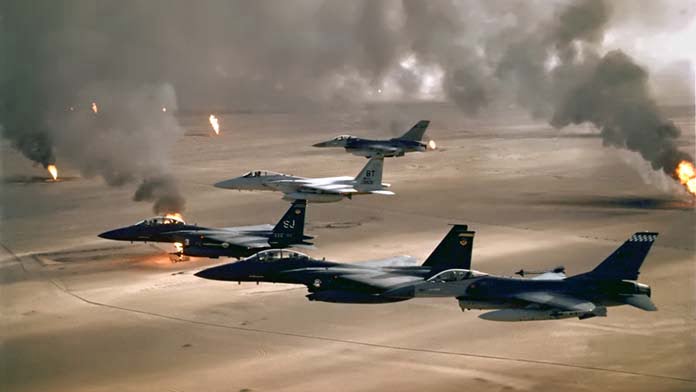Control of the Middle East has been a key focus for the world’s big powers due to its immense reserves of oil, and Israel remains vital to preserving it, writes James Supple
There is an overwhelming reason behind the US’s dedication to arming Israel, and the importance of the wider Middle East—oil.
For the last century, the world’s imperialist powers have scrambled to control it.
As the US emerged as a superpower following 1945 the State Department described Middle East oil as, “a stupendous source of strategic power and one of the greatest material prizes in world history”. And the US set out to ensure it had control—using brutal violence whenever necessary.
Even today the Middle East produces just over 30 per cent of the world’s oil, and sits on half of proven reserves.
Oil is the lifeblood of every advanced economy and is central to modern capitalism.
It powers both road and air transport, and is also key to modern manufacturing.
Plastics derived from oil are found in everything from computers to packaging, pens, car tyres, toothbrushes and mobile phones. Oil and gas are also used to produce fertilisers and pesticides, clothing, detergents, cosmetics and paints.
Oil also powers the fleets of fighter jets, tanks and shipping that the world’s most powerful states use to project military force.
It was the First World War that showed decisively the role of oil for the military machines of the great powers.
“The Allies were carried to victory on a flood of oil”, Britain’s Lord Curzon noted in the aftermath. The efforts to cut off Germany’s oil supplies had hindered production of aircraft and trucks, contributing to its defeat.
Much of this oil came from the US, the first country where it was drilled on a large scale.
Britain, lacking oil supplies of its own, stuck the secret Sykes-Picot agreement to divide the Middle East with France, to help to get its hands on sufficient reserves.
At first the West took control of the Middle East’s oil directly.
A handful of US and European companies known as the “Seven Sisters” controlled 85 per cent of world oil production until the 1970s.
They worked together to exploit the oil fields of Iran, Iraq and Saudi Arabia. The seven companies later merged into four: BP (British Petroleum), Royal Dutch Shell, Exxon-Mobil and Chevron.
All of them remain enormously profitable. The world’s five largest listed oil companies, including one more major European firm, TotalEnergies, have made over $400 billion between them since Russia invaded Ukraine in early 2022.
Their dominance in the Middle East ended when the oil producing countries established the OPEC consortium and took control of oil for themselves in 1973.
Today state-owned oil companies including Saudi Aramco, PetroChina, and Brazil’s Petrobras are some of the world’s biggest producers.
Despite the beginnings of a shift globally to renewable energy in the face of the climate crisis, the world’s ruling classes are not contemplating the end of oil any time soon. The International Energy Agency predicts a peak in oil demand by 2030, but says global consumption will remain above 50 million barrels a year by 2050.
A UN report in November showed oil producing countries are on track to increase production, with plans to pump out 29 per cent more oil and 83 per cent more gas by 2030.
This would “throw humanity’s future into question”, producing 70 per cent more carbon pollution than needed to push global heating past two degrees.
But while there are still profits to be made oil companies are not going to stop cooking the planet.
US control
US efforts to dominate the Middle East have produced a string of invasions and interventions, including the coup in Iran in 1953, the dispatch of 14,000 troops and the US Sixth Fleet to Lebanon in 1958, backing Iraq with arms and support during its war against Iran in the 1980s, then invading Iraq twice, in 1991 and 2003.
Support for Israel has also been one of the pillars of US control, with Israel proving its worth as a military power able to keep the Arab states in line and protect Western interests.
As the Israeli newspaper Ha’aretz put it in 1951, “Strengthening Israel helps Western powers maintain stability in the Middle East. Israel is to become the watchdog.”
Israel proved its worth to the US decisively in the 1967 war, when it defeated Egypt, Jordan and Syria simultaneously, checking the rise of Arab nationalist regimes that had threatened the assets of Western companies.
Since then the US has given Israel enormous sums of military aid, designed to ensure its has a “qualitative military edge” in terms of arms and technology over all the other states around it.
Israel’s interests do not always coincide exactly with those of the US. Its actions are often so aggressive and extreme they go beyond even what the US thinks is wise. The scale of the current genocide in Gaza is just one example.
Even as he declares his “devotion” to support for Israel, US President Joe Biden has sought to restrain it from plans to send troops into Rafah, threatening a massacre among the 1.4 million Palestinians crowded in there, and to prevent a wider Israeli war against Lebanon, Syria and Iran.
The US has also opposed plans floated by Israeli Prime Minister Benjamin Netanyahu to expel Palestinians from Gaza into the Egyptian desert, in another wave of ethnic cleansing that would destabilise the regime in Egypt.
Israel is a settler-colonial state and a highly militarised society that is hell-bent on domination over both the Palestinians and its near neighbours.
The US, on the other hand, also wants to ensure the alliance and support of nearby Arab governments.
The autocratic regimes in Jordan and Egypt receive billions in US economic aid to help them police their own populations and hold onto power.
But the US will always ultimately back Israel as its most dependable ally in the region.
Saudi Arabia, an absolute monarchy with the largest oil reserves in the whole region, has also been a key US ally since 1945.
The discovery of huge oil reserves there from 1938 led US President Franklin Roosevelt to meet King Abdul Aziz directly in 1945, with the US declaring the protection of Saudi Arabia as of vital interest to the US.
US wars
The US war on Iraq in 1991 was fought partly to show the US’s willingness to guarantee Saudi security. Iraq’s President Saddam Hussein had invaded Kuwait and fired missiles at Saudi Arabia, which borders the country.
The broader aim was to ensure the “free, uninterrupted flow of oil from the Gulf”, as US state department official Robert Kimmett put it at the time. The US wanted to prevent a single hostile state from controlling too much of the valuable commodity.
Or as Lawrence Koth, a former US assistant defence secretary, put it, “If Kuwait grew carrots, we wouldn’t give a damn”.
But the US wars in Afghanistan and Iraq after 2001 proved disastrous. The US was unable to establish the stable client regime it had hoped for in Iraq, and eventually withdrew with its tail between its legs.
In Iraq it left over one million dead, unleashed vicious sectarianism, and reduced the whole country to ruin.
The main beneficiaries of the wars was Iran, the state most hostile to the US in the region.
The Iranian regime now has significant influence in Iraq’s government, and sympathetic militia groups across the country.
Nor are the US’s ties with Saudi Arabia as firm as in the past. The US remains important to the Saudis’ military security but its rulers are increasingly economically tied to China.
The biggest importers of Middle Eastern oil are China, India, Japan and South Korea.
Japan gets 90 per cent of its oil from the Middle East, South Korea 59 per cent, India around half, and China a third.
The sheer size of the Chinese economy however means it that it dominates these flows.
As political economist Adam Hanieh has noted, “By 2019, around 45 per cent of all the world’s oil exports were flowing to Asia—with more than half of these destined for China alone.”
Nonetheless the US is still determined to exert influence through the use of its enormous military power. There remain around 30,000 US troops stationed in bases across the region.
The US itself does not need Middle Eastern oil.
It produces enough oil to meet its own needs domestically, and can also rely on supplies from Canada and Latin America.
But its military power means it can guarantee oil supplies to its allies, and potentially cut them off to adversaries in the event of war.
This is exactly the way the US responded to the challenge of Japan in the lead up to the Second World War. Japan faced a crippling US embargo on oil and other imports that threatened to paralyse its economy and its capacity to wage war.
Japan’s response was to seize oil supplies in Indonesia and to bomb Pearl Harbour.
Its decline in power and influence makes the US even more reliant on Israel than in the past.
In the face of military defeats in Iraq and Afghanistan, and its declining economic leverage, it needs to ensure its other major asset in the Middle East—Israel’s military might—remains secure.
That means Joe Biden continues to arm Israel so it can carry out its massacres in Gaza, even as he mumbles criticism of its efforts to deliberately starve the population.
US imperialism wants to focus on China as the major threat to its power. But it is still determined to hold onto its influence in the Middle East.
The oil, and Israel’s role in protecting it, could also prove to be a weapon against China.
The US support for genocide in Gaza is part of preserving its global power.






